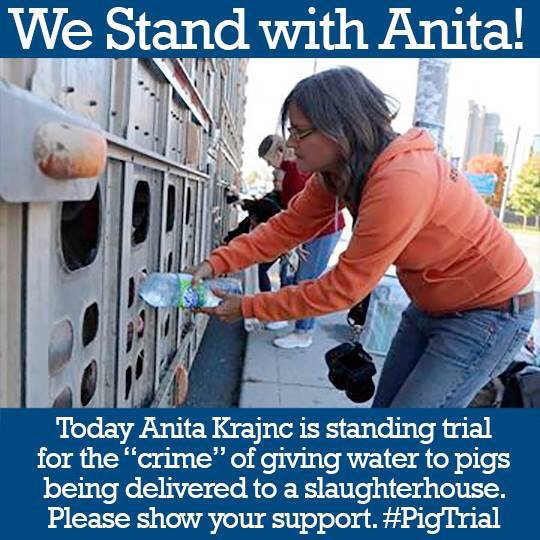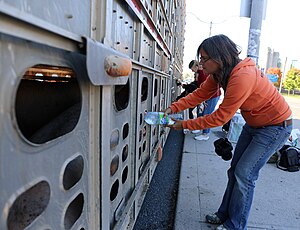| PLEASE, become a vegetarian |
- During World War II the Nazi regime transported millions of Jews for many days at the time in cattle cars without food or water on their way to slaughter. Many died on the way.
- As those trains passed towns and villages, people got a glimpse of human beings crammed inside moaning with hunger and thirst, but looked the other way not because they were afraid of authorities, but because they simply did not care. They regarded Jews as inferior beings not worthy of their time.
- This attitude towards what they considered "lesser beings" was not exclusive to Germans or to Nazi sympathizers. It is part of human nature, and today we see it reflected in our indifference to the inhumane way animals are raised and transported to slaughter. We really don't care.
- This article is about the torture suffered by pigs in Canada. But livestock are abused all over the world, even in Europe and the United States, as you can see in the following video:.
MERCY FOR ANIMALS
VIDEO: "FROM FARM TO FRIDGE"
The systematic and often LEGAL torture of animals at industrial farms.
- Although the standards are higher in the west, that does not mean that they are always adhered to. Hidden cameras keep exposing sadistic behavior towards food animals even in the most advanced farms.
- Secretly filming animal abuse at industrial farms is now being regarded as a crime. Not the abuse itself, but exposing this abuse. The so-called AG-GAG laws (such as in Idaho) make it a crime to secretly film farm animal abuse.
- In sweltering temperatures pigs suffer from dehydration, heat stroke, heart attacks, and death.
- You will also see how pigs are mutilated and sadistically beaten up prior to being loaded up into trucks. Government inspectors fail to prevent all this torture.
HIDDEN CAMERA VIDEO - What the media covering this trial in Canada don't dare to tell you: The sadistic torture of pigs prior and during transport to slaughter.
CAUTION: scenes of extreme cruelty
MERCY FOR ANIMALS VIDEO
- If we cared about this abuse the meat industry would not get away with the WORST AND MOST INHUMANE STANDARDS in the Western world for the transportation of livestock to slaughter.
- Canadian regulations governing the transportation of farmed animals date back to 1975.
- They currently allow for cattle to be in transit for 52 hours without access to food or water, while the maximum for pigs and chickens is 36 hours.
- In the United States, livestock can only be on a truck for 28 hours, at which point they must be off-loaded and rested.
- In Europe, animals such as sheep and cattle can be in transit for 14 hours before they need to be rested and given water, while pigs don’t have to be off-loaded for 24 hours if they have access to water at all times.
- For this compassionate act she now faces a maximum of six months in jail or a $5,000 fine if convicted. She has pleaded not guilty.
- Toronto Pig Save, which Krajnc founded, regularly holds "vigils" in front of local slaughterhouses to "bear witness" to the animals' final moments
Watch VIDEO of the confrontation between Anita and the truck driver:
- Animal welfare expert Armaiti May testified in court that the pigs "in all likelihood were in severe distress."
- She told The Washington Post that her defense lawyers will argue she was not breaking the law but acting in the public good.
Hidden camera video scenes
Forcing injured, dying animals to moveThe driver, Jeffrey Veldjesgraaf testified that "his main concern was over what was in the water that Krajnc's group gave the pigs, and whether it might contaminate the livestock," CBC reported.- The case has attracted the attention of other animal rights activists, who are tweeting messages of support using the hashtags #PigTrial and #StandWithAnita.
- In an interview with The Canadian Press last year, the farm's owner, Eric Van Boekel, said he didn't have a problem with Anita’s protesting; he just didn't want her to touch his "stuff.''
- Mercy for Animals Joe Loria wrote: Animals are not stuff. They are living, feeling beings. In fact, pigs are complex creatures who vocalize emotions. They are even reported to have higher IQs than dogs, chimpanzees, and even three-year-old humans.
Canada's livestock transportation rules 'worst in the Western world': advocate
By Michael Shulman, CTV News, Canada
March 17, 2016
Thousands of farm animals are transported across Canada every week. But the conditions they experience are regulated by rules that are decades old, and according to many, inhumane.
Continue reading and see references
Source
http://www.ctvnews.ca/canada/canada-s-livestock-transportation-rules-worst-in-the-western-world-advocate-1.2820563
Other references
http://www.mercyforanimals.org/wtf-woman-on-trial-for-giving-water-to-dehydrate
http://transport.mercyforanimals.org/
http://www.cbc.ca/news/canada/hamilton/anita-krajnc-trial-day-two-1.3736351
http://www.npr.org/sections/thetwo-way/2016/08/26/491534419/animal-rights-activist-on-trial-in-canada-for-giving-water-to-pigs
http://globalnews.ca/news/2899974/trial-begins-for-ontario-woman-charged-with-mischief-for-giving-water-to-pigs/
http://www.ctvnews.ca/canada/canada-s-livestock-transportation-rules-worst-in-the-western-world-advocate-1.2820563
https://en.wikipedia.org/wiki/Anita_Krajnc_case
Abuse of pigs in Britain - http://www.dailymail.co.uk/news/article-2537393/WARNING-GRAPHIC-CONTENT-Tyson-Foods-changes-animal-care-policies-supplying-farms-shocking-video-piglets-kicked-tortured-surfaced-two-months-earlier.html
Ag-Gag Laws
https://en.wikipedia.org/wiki/Ag-gag
http://www.theatlantic.com/business/archive/2014/03/the-law-that-makes-it-illegal-to-report-on-animal-cruelty/284485/
TWITTER HASHTAGS:
https://twitter.com/hashtag/compassionisnotacrime
https://twitter.com/search?q=%23StandwithAnita
https://twitter.com/search?q=%23pigtrial
https://twitter.com/TorontoPigSave
Anita Kranjnc Toronto Pig Save
http://www.torontopigsave.org/about-us/
Canada's regulations governing the transportation of farmed animals date back to 1975. They currently allow for cattle to be in transit for 52 hours without access to food or water, while the maximum for pigs and chickens is 36 hours.
Krista Hiddema, managing director of Mercy for Animals Canada, says these regulations fall well below the standards of other countries.
"Our transportation regulations in Canada are the worst in the Western world," said Hiddema.
"Animals are often transported thousands of kilometres without any food, water, shelter or any protection from the elements."
And these conditions appear to be taking their toll. The Canadian Food Inspection Agency says between two and three million animals die during transport every year.
Sayara Thurston, campaign manager with Humane Society International Canada, echoed Hiddema's concerns, pointing out that Canada's harsh winters, and some regions' balmy summers, also leave many animals vulnerable during transport.
"They are also not protected from the elements, so there is no minimum temperature in Canada below which it is illegal to transport animals," said Thurston.
Canada's laws stand in contrast to those of other Western nations, many of which detail stricter conditions for transportation.
In the United States, livestock can only be on a truck for 28 hours, at which point they must be off-loaded and rested.
And in Europe, animals such as sheep and cattle can be in transit for 14 hours before they need to be rested and given water, while pigs don’t have to be off-loaded for 24 hours if they have access to water at all times.
"They seem to understand better the conditions animals need, which we do not seem to relate to in Canada," said Stephanie Brown, director of Canadian Coalition for Farm Animals.
Here's a list of other regions' regulations concerning the transportation of farmed animals:
The European Union
- Young, unweaned sheep, goats, cattle and other ruminants can be transported for two nine-hour periods with an hour of rest with water each. Then they require 24 hours rest at a control post.
- Pigs can be transported for 24 hours as long as they have access to water at all times. Then they must be unloaded at a control post before the clock restarts.
- Cattle and sheep can be transported for two 14-hour periods with one hour of rest with water.
- Horses can be transported for 24 hours, during which water must be provided every eight hours.
- If birds are transported for more than 12 hours, feed and water must be made available.
- Temperatures must be kept within the range of 5 C and 30 C, with leeway for five degrees plus or minus.
- Other requirements include: automatic fans, GPS, temperature sensors, temperature alarms, emergency feed, a water tank, water drinks that are accessible to the animals, partitions and bedding.
Australia
- Cattle over six months old can travel a maximum of 48 hours without water. They must also be granted a 36-hour rest period before and between trips. While cows between 30 days old to six months can be transported for 24 hours without water and must have a rest period of 12 hours. There are other exceptions for lactating cows with calves, calves without their mothers and pregnant cattle.
- Pigs can be transported for a maximum of 24 hours without water. They must also be given a 12-hour rest period before and between trips. Meanwhile, lactating sows, piglets and weaners can be transported for 12 hours without water and must be given a 12-hour rest period.
- Poultry can be transported for 24 hours without water. While chicks can be transported for 60 hours, with an additional 12 hours allowed for hatching time.
And it isn't only animal rights activists who are rallying to change the regulations in Canada.
Montreal-based dairy company Saputo and organizations like the Dairy Farmers of Canada are also calling for change.
"It is an important issue that we all share with responsibility to ensuring animals receive the proper care," said Graham Lloyd, direct of communications for the Dairy Farmers of Canada.
Maple Leaf Foods is also supportive of reforms.
"Maple Leaf has and continues to voice the need to enhance current federal livestock transportation regulations. We look forward to working with the new federal government to address this critical area of animal welfare," Greg Douglas, vice-president of the company's animal care division told CTV News in an email.
Several petitions have also been launched calling on the federal government to enact changes.
And Canadians appear to support reform to the country's rules governing the transportation of farmed animals, according to a study funded by Mercy for Animals.
The non-profit group contracted NRG Research Group to handle the study. A total of 1,002 interviews were conducted over the phone with Canadians across the country last October, with a margin of error of plus or minus 3.1 percentage points, 19 times out of 20.
According to its findings, 97 per cent of Canadians said it is important for animals to be transported in a humane manner that addresses their basic needs.
A further 90 per cent said they supported the introduction of new regulations to improve protections for farmed animals during transport.
Ninety-five per cent of those surveyed also said it was important to ensure that animals are protected from weather extremes, and provided with basic food, water and rest during transportation, even if that came at a higher cost for livestock producers and transportation companies.
The survey also offered participants five possible regulatory changes all of which received "strong support," including:
- Strong and effective penalties to ensure humane treatment
- Mandating the availability of food and water for trips over eight hours
- Requiring specialized animal-specific training for livestock handlers
- Putting in place rules to protect animals from Canada's weather extremes
- Limiting the time a farmed animal can be kept on a truck without food, water or rest to no more than eight hours.
The minister of agriculture wasn't available for comment on Wednesday, but the agency says it is working to amend the regulations.
It didn't specify when any improvements would be made public.
http://www.ctvnews.ca/canada/canada-s-livestock-transportation-rules-worst-in-the-western-world-advocate-1.2820563
Other references
http://www.mercyforanimals.org/wtf-woman-on-trial-for-giving-water-to-dehydrate
http://transport.mercyforanimals.org/
http://www.cbc.ca/news/canada/hamilton/anita-krajnc-trial-day-two-1.3736351
http://www.npr.org/sections/thetwo-way/2016/08/26/491534419/animal-rights-activist-on-trial-in-canada-for-giving-water-to-pigs
http://globalnews.ca/news/2899974/trial-begins-for-ontario-woman-charged-with-mischief-for-giving-water-to-pigs/
http://www.ctvnews.ca/canada/canada-s-livestock-transportation-rules-worst-in-the-western-world-advocate-1.2820563
https://en.wikipedia.org/wiki/Anita_Krajnc_case
Abuse of pigs in Britain - http://www.dailymail.co.uk/news/article-2537393/WARNING-GRAPHIC-CONTENT-Tyson-Foods-changes-animal-care-policies-supplying-farms-shocking-video-piglets-kicked-tortured-surfaced-two-months-earlier.html
Ag-Gag Laws
https://en.wikipedia.org/wiki/Ag-gag
http://www.theatlantic.com/business/archive/2014/03/the-law-that-makes-it-illegal-to-report-on-animal-cruelty/284485/
TWITTER HASHTAGS:
https://twitter.com/hashtag/compassionisnotacrime
https://twitter.com/search?q=%23StandwithAnita
https://twitter.com/search?q=%23pigtrial
https://twitter.com/TorontoPigSave
Anita Kranjnc Toronto Pig Save
http://www.torontopigsave.org/about-us/
**************************************






No comments:
Post a Comment
Thank you for visiting my blog. Your comments are always appreciated, but please do not include links.